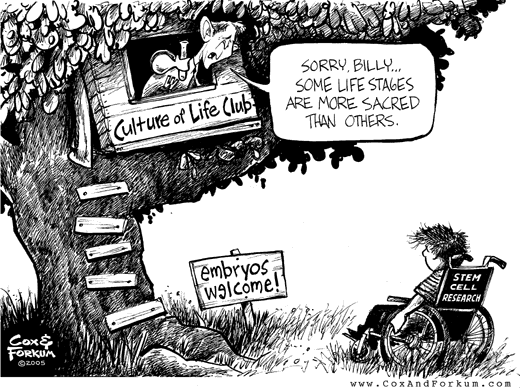Embryonic Stem Cell Research, where to begin? These words encompass so much to so many people; hopes of living, the thought of murder, and the morals and values parents grew up with and now pass on to future generations.
Embryonic Stem Cells is defined by the medical dictionary as: “Human embryonic: Also known as a human pluripotent stem cell, one of the "cells that are self-replicating, are derived from human embryos or human fetal tissue, and are known to develop into cells and tissues of the three primary germ layers. Although human pluripotent stem cells may be derived from embryos or fetal tissue, such stem cells are not themselves embryos". Basically, this long and semi-complicated definition boils down to the fact that stem cells are a group of cells (approximately 50-150 cells big) called a blastocyst that can divide to form new cells by itself. The blastocyst comes from human embryos and fetal tissue but can be derived in other ways. The way that stem cell lines are derived is simply shown on this site under the interactive headline, beneath basics, titled "How it works".
Why do we even concern ourselves with these cells you may ask? What makes them such a hot button issue for millions across the globe? Stem cells are unprogrammed cells in the human body that can be described as "shape shifters." The cells have the ability to change into any type of cell that you would find the body. Stem cells are at the center of a new field of science called regenerative medicine. Because stem cells can become bone, muscle, cartilage and other specialized types of cells, they have the potential to treat many diseases, including Parkinson's, Alzheimer's, diabetes and cancer, anything that has to do with the regeneration or replacing of cells. Eventually, they may also be used to regenerate organs, reducing the need for organ transplants and related surgeries. One revolutionary study made history by being the first human stem cells to be used to repair heart muscle cells in a rat. It is very interesting to look at the statistics. In a survey, 54% of Americans support embryonic stem cell research which is down from the 2005 survey, but when asked if they support the use of embryonic stem cells in order to pursue treatment for themselves or family members afflicted with a condition such as Parkinson's Disease or spinal cord injury, 70% said yes. Many people only look embryonic stem cell research as a moral or ethical issue, not even considering the effects of the research that will undoubtedly one day affect their lives or the lives of someone they love.
Now I do have to add that there is a difference between adult human stem cells and embryonic stem cells. Adult stem cells can be found naturally in the body. It is the body’s way of attempting to repair itself as a defense; however the origin of these cells is unknown. The problem with adult stem cells is that they are very limited as far as what type of cell they can become. Adult stem cells can only differentiate into various types of cells from the original tissue it came from. On the other hand, embryonic stem cells come from left over invetro fertilization or aborted fetuses, and now a new way has been found to extract some from umbilical cords. Also, the latest update comes from two teams of scientists who have found a way to create embryonic stem cells without destroying an embryo, but this technology is still farther in the future than some would like to look. Embryonic cells can become anything, anyone of the different cells in your body from skin to the lung can be formedu through the development of these cells.
One hurtle lies in people’s perspective, the ethical issue at hand. Is it okay to destroy a blastocyst in the name of science? Is it okay to kill the potential that the cells hold? Many people would argue no because that potential in question is possible human life and even this small group of cells has the basic human right to live. A similar concept is used in the death penalty argument. Is it okay for the other people or even the government to step in and restrict the collection of embryonic stem cells or to condemn a potential life to be destroyed. Apparently President Bush believes just this . The President passed a bill stopping the federal funding of further collection of embryonic stem cells, only funding research on lines already derived, where the “life or death” choice has already been made. However, the possibility of privately funded research on new lines is possible. The problem is finding the funds. The NIH or National Institute of Health is only one of a few revolutionary locations in the United States (even though many other places around the world conduct and support research) that is able to continue studies on the existing stem cell lines. This debate is not even including the possibility of fertilizing an egg for the purpose of research. A whole other debate revolves around the idea of created a fertilized egg for the sole reason of destroying it in research.
On the other hand many would argue yes because by destroying a ball of cells with no thoughts, no future, no feeling, you are using it to create hope and possibly cures for thousands of suffering people living today. The irony is, what if one of the blastocysts saved by this new bill becomes one of the thousands in need of its research due to lung cancer, heart disease, kidney failure, or any one of the other countless medical conditions?

No comments:
Post a Comment